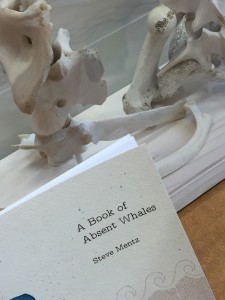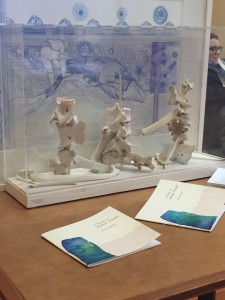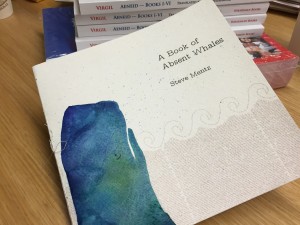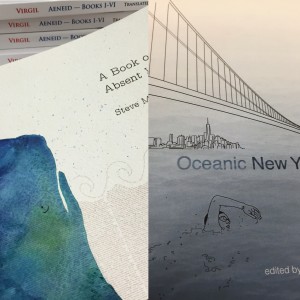 It’s strange to hear an imaginative and inviting triplet of opening plenaries with the reservation for your ride to the airport just a few hours away. Was I even at #babel15?
It’s strange to hear an imaginative and inviting triplet of opening plenaries with the reservation for your ride to the airport just a few hours away. Was I even at #babel15?
For not that many hours during the first quarter (generously) of the conference, I was “on” and “off” the books with this merry crowd of scholar-players. As I sit now on Fri afternoon in a crowded Pearson Airport watching the delays build for my flight back to JFK, it’s hard to believe any of it it. BABEL is one of the most reliable TAZs — Temporary Autonomous Zones — that I know, and that’s why I put myself through the international wringer for such a quick trip. Even a short sip at the fountain refreshes. I’m now exiled from the conference’s “sixty bokes” paradise, unless maybe writing these airport-words still connects me to the insistent imperatives of now! and why not? percolating through the event. 
My contribution to the feast was A Book of Absent Whales, a collaborative project that I hope to have some time to blog about soon. I worked with Patrick Mahon, a visual and conceptual artist based at Western University in London, Ontario. Together we assembled a display this morning — it’s still there in the Great Hall of the Centre for Medieval Studies as I type this — containing several different things: a case full of beluga whale and caribou bones that Patrick was given in an Inuit community in northern Canada; a scattering of blue and transparent glass sculptures that Patrick made in the same shapes as the bones; a looped video of Patrick’s hand repeatedly writing, in what he calls “schoolteacher’s cursive,” a line from Melville; and a book of poems I wrote under the same title as the whole project. At the last minute I snuck in a copy of Oceanic New York, which carries on its watery back another seventeen collaborators, several of whom are BABEL-ing now.
Absent Whales: I knew when I was thinking about what to bring to #babel15 that I wouldn’t be able to stay long. 
The triplet plenary was worth the trip even if I hadn’t been bringing whales. After a series of moving introductions from Suzanne Conklin Akbari (whom I was pleased to meet in a non-virtual context), Liza Blake, Eileen Joy, and Cat Criger, who gave us a First Nations invocation, Alex Gillespie began the first talk with a fast, funny, and acute reconsideration of what we know (or don’t) about Chaucer’s books. Alex, one of several people at the conference who I know only through their How We Write essays, reminded me of what I loved about book history when I started grad school back in the mid-90s: she gave us a tour of premodern books at once demystifying, unsentimental, and powerfully attuned to what makes books meaningful, in both figurative and material terms.
The next speaker, Random Cloud, he of many names and pseudonyms, also returned me to my heady first scholarly forays in the byways of Book History. He gave what’s in some ways seems like the ideal form of a certain mode of book history lecture, demonstrating that he’d learned to read the blank pages of 16c books. The tricks involved double offset printing practices and “conversations” between pages within and between early modern books — but I must admit I’m not completely sure I could explain the process cogently. There’s magic in the archive: that much I’m sure of.
Last up was Whitney Trettien, who foregrounded connections between DH maker culture, ‘zine / craft culture, and the historical practices of book makers in assorted times and places. She connected a series of video “project projects” she co-produced in Durham when she was a grad student with cut-and-paste (the literal kind, with real paste) work done by a descendent on the biography of Nicholas Ferrar, founder of the Little Gidding religious community in the 1630s near Cambridge. I have trouble thinking about Little Gidding without T.S. Eliot’s sonorous canonicity ringing in my ears: “We only live, only suspire / Consumed by either fire or fire.” Might the new tools Whitney and others at and beyond BABEL are building endure those familiar but still blazing flames? Or elude them?
No fire is more BABEL-icious that the spirit of what Eileen and others call “radical conviviality,” and I felt warmed by those flames over the past not quite twenty-four hours. Was #babel15 a place that even welcomed absence?
Which brings me to one last anecdote that I can’t resist telling. I ate lunch alone, a cardiac-threatening dish of poutine at the bar next to the Holiday Inn while listening to the pregame of the Blue Jays v Texas Rangers. I’d spent my post-plenary milling-around time trying to touch too many bases, saying hello to far-flung BABEListi many of whom I’m not likely to see for too long. Not paying attention to that most basic of all conference skills, assembling a lunch party, I eventually came out of the washroom [sic] to an empty hall. I got turned around getting out of the building and by that time everyone had dispersed.
 It was fine. The poutine wasn’t quite up to Quebec standards. I sat and wrote and thought about Absent Whales, the slippery promise of collective identities, and my daughter’s 13th birthday, toward which my delayed flight to New York will deliver me later tonight.
It was fine. The poutine wasn’t quite up to Quebec standards. I sat and wrote and thought about Absent Whales, the slippery promise of collective identities, and my daughter’s 13th birthday, toward which my delayed flight to New York will deliver me later tonight.
Looking forward to #babel17 already!
Leave a Reply